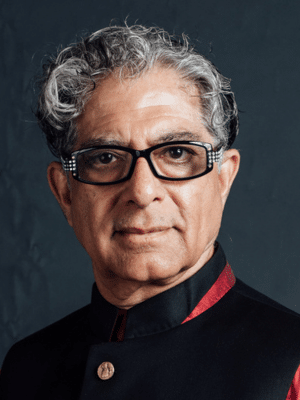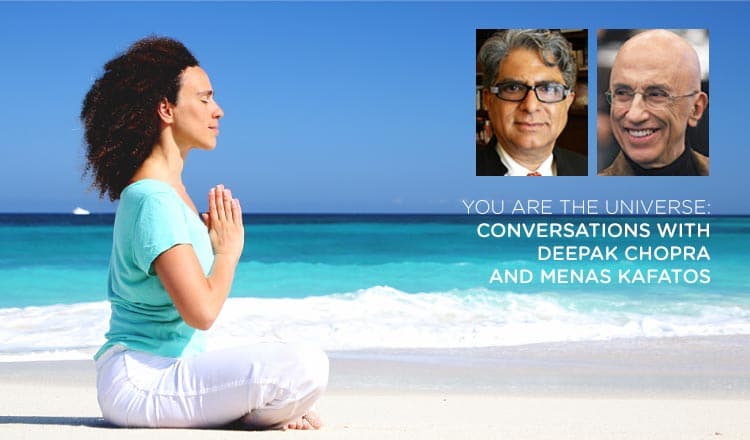Sivananda Bahamas Blog
Expand Your Horizons …
Our Blog
Q&A with Deepak Chopra
Question: You have a book forthcoming with Dr. Menas Kafatos, You Are the Universe. What would you say are the most important points that you would like your readers to walk away with from this book?
Deepak Chopra’s Answer:
For thousands of years, human beings have tried to understand reality and asked themselves questions like, "Who am I?" "Do I have a soul?" "What is the meaning of death?" "Is there a god?" "What is the nature of life?" "How did life begin?" "What is the nature of time?" "Why is the universe fine-tuned for our existence?" And, "What is the essential substance out of which everything is constructed?" In a sense, the book is a journey about how human beings have thought about existence.
Human beings have had a version that says that God, or something called God, created the universe. That's found in the Book of Genesis and in all the other mythologies of the world. Religious texts are cultural mythologies that have been, unfortunately, interpreted literally. The idea that there's an entity called God that created the universe has existed for a long time until, I think, Isaac Newton who said, "The universe is governed by six laws," not saying why the laws exist. After that, everything is deterministic. And that worked very well for creating every kind of technology that the Industrial Age saw – from landing men on the moon to sending a robot to Mars – these are a result of the mechanistic understanding of the universe and so-called laws of the universe.
That model did well until Einstein came along and had two other ideas, which both fall under the umbrella of the relativistic universe. One has to do with the special theory of relativity – the speed of light is a constant for all frames of reference and mass and energy are equivalent. Also, the general theory of relativity, which says that gravity is a wrinkle in space-time, something that can't be imagined, but its calculations give us black holes and event horizons, singularities, and the ability to detect gravitational waves.
That model, in a way, transcended the Newtonian model of reality, and then you have quantum physics. This led to the uncertainty principle, wave-particle duality. But even then we could not answer fundamental questions like, "What created the Big Bang?" "What created the laws of nature?" And also, "How did the universe come into existence?" That led to newer theories like chaotic inflation, eternal inflation, and on and on.
None of these theories answer the question of what is the nature of existence and how do we know that we exist. None of these theories actually explain the human experience. When you look around and you see the room you're sitting in, look at your own body, or observe your thoughts – no experience, neither mental, cognitive, or perceptual, is explainable by science.
I think what most scientists– Menas is of course an exception – don't really even think about is the fact that science is just another model for explaining reality without explaining how we experience reality. It's a good model because it makes possible for me to get on a plane and come to the Bahamas, but still, it's a model. A model.
Where we went with this book was beyond what science has to say. Science is a system of thought just like religion, philosophy, mythology, and theology are systems of thought. No system of thought can give us access to reality. It creates a model of reality. So how do we ultimately understand what is reality?
From a logical point of view, reality must be that in which these models are made. We can call that awareness or consciousness. As we go to the deeper yoga traditions – not yoga as philosophy, but yoga as actually transcending thought to experience the awareness or the consciousness of which thought is a modification – that gives us a clue to what reality might be. Some ancient wisdom traditions have claimed that all of reality is one substance. The word “substance” is not really adequate, but let's say the world is one substance in the way that a river, cloud, waterfall, dewdrop, or spring are all of one substance that we can all call water. But that one substance can appear as vapor and all the other things I mentioned, or as innumerable ice blocks of different shapes and sizes. But it’s still one substance.
The reality that we experience as the universe with stars and galaxies and trees and rocks and the earth and planets and galaxies – and our own body, brain, mind – are all one substance. But it’s non-material and unimaginable because it’s spaceless, timeless, and formless. Our imagination is based on experiences in space and time. Mathematics goes far in giving us a clue, but mathematics uses symbols like infinity and zero that can't really be imagined.
What is reality? Reality is formless, unimaginable – cannot be perceived, seen, or thought of. But without it there would be no experience. When we get to the end of our book, you realize that everything that we call reality is a human construct. Human – not a dolphin, dog, or insect construct. Even dolphins, dogs, insects, and other animals are human constructs. I don't think any dog knows that it's called a dog.
We use words. We say "mind." In the deeper realm, there is no mind. That's a concept for experience of existence and its modifications. There's no such thing as a body and there's no such thing as universe. They're all concepts for experiences that are modifications of the self. That's all there is. Once you really understand that then you also understand that birth and death are concepts. There's no reality to any of that. The only reality is the self that is modifying into these experiences.
On a practical level, I think it’s liberating to realize that the world is a projection of yourself. You were never born and you're not subject to death. If you can see, describe, conceptualize, imagine, or perceive it in any form, then it's not real.

DEEPAK CHOPRA MD, FACP, FRCP, is a Consciousness Explorer, and a world-renowned pioneer in integrative medicine and personal transformation. Chopra is co-founder of DeepakChopra.ai, his AI twin and well-being advisor. He also co-founded Cyberhuman, a transformative suite of personalized health and well-being solutions. Chopra is a Clinical Professor of Family Medicine and Public Health at the University of California, San Diego, and serves as a senior scientist with Gallup Organization. He is also an Honorary Fellow in Medicine at the Royal College of Physicians and Surgeons of Glasgow. He is the author of over 95 books, translated into over forty-three languages, including numerous New York Times bestsellers.
For the last thirty years, Chopra has been at the forefront of the meditation revolution. His mission is to create a more balanced, peaceful, joyful and healthier world. Through his teachings, he guides individuals to embrace their inherent strength, wisdom, and potential for personal and societal transformation.
In his latest book, *Digital Dharma* (Harmony/Rodale, 09/17/24), Chopra navigates the balance between technology and expanded awareness, explaining that while AI cannot duplicate human intelligence, it can vastly enhance personal and spiritual growth. TIME magazine has described Dr. Chopra as “one of their top 100 most influential people.”








